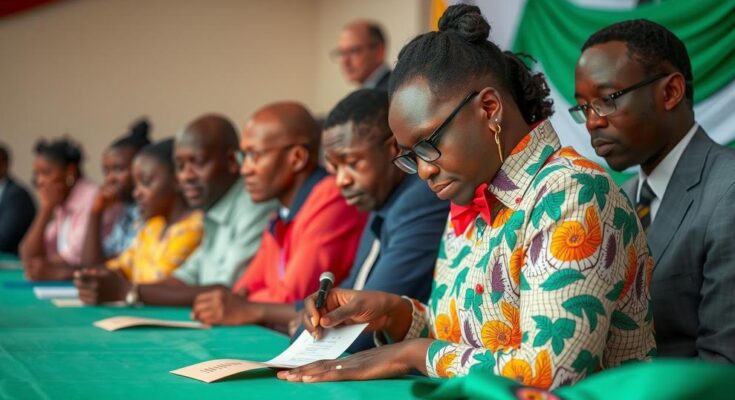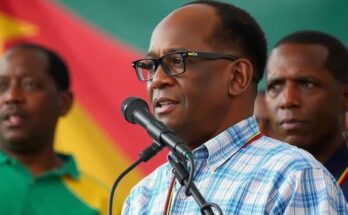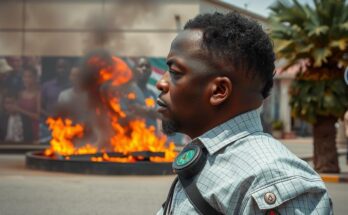Ghana recently held presidential and parliamentary elections amid hopes for economic recovery following a significant debt crisis. The primary contenders are Vice President Mahamudu Bawumia of the ruling NPP and former President John Dramani Mahama of the NDC, with Mahama expressing confidence in his potential to reclaim the presidency. Both candidates highlighted a generally peaceful electoral process despite minor violence, and the results are expected shortly, signaling a crucial decision for the nation’s future.
Ghana recently conducted presidential and parliamentary elections amidst public anticipation for an economic resurgence following a severe financial crisis that resulted in a significant debt default within the country. With President Nana Akufo-Addo stepping down after completing two constitutionally mandated terms, the electoral competition has emerged primarily between Vice President Mahamudu Bawumia of the ruling New Patriotic Party (NPP) and former President John Dramani Mahama of the National Democratic Congress (NDC).
Twelve candidates contested the presidency, but the race is largely viewed as a dual between Mahama, who previously held office from 2012 to 2016, and Bawumia. Recent opinion polls indicate that Mahama has a favorable chance for a comeback, and he attributes the country’s economic struggles to Bawumia’s association with current policies. Mahama has pledged to renegotiate a $3 billion IMF bailout deal aimed at financial restructuring established last year, after Ghana sought assistance from the International Monetary Fund during the peak of the crisis in 2022.
Upon voting in his hometown of Bole, Mahama remarked, “This is the only election that we can all see the direction of the outcome before we start voting. We are hopeful and confident that we’ll win.” In contrast, Bawumia, expressing optimism after voting in Walewale, stated, “By the grace of God, I’m very hopeful of winning this election. I think that we have done a lot of work. We have put our message to the people, I think the message has been well received.”
Bawumia has underscored the gradual economic recovery, highlighted by a 6.9% year-on-year growth in the second quarter of 2024, marking the most robust expansion in five years. Both candidates noted that the voting process remained largely peaceful, although some instances of violence occurred at the polls, resulting in one fatality. Benjamin Bano-Bio, the director of electoral services, confirmed that the verification process was effective and that voting went smoothly for most voters.
Following the conclusion of the polls at 1700 GMT, election officials commenced the ballot count amidst the supervision of party representatives. Preliminary legislative results are anticipated to be released on the night of the election, with presidential outcomes expected by Tuesday, subject to early trends in vote counting. Out of Ghana’s 34 million population, approximately 18.7 million individuals were registered to cast their votes in this crucial electoral exercise.
The elections in Ghana were held against a backdrop of severe economic challenges that have burdened the nation, primarily due to high debt levels and previous government policies. Ghana, recognized as the second-largest cocoa producer globally and a notable gold mining nation, sought to revitalize its economy through this democratic exercise. The political landscape has been significantly shaped by the leadership of President Nana Akufo-Addo and the ongoing debates regarding economic management, especially in the context of a recent bailout from the International Monetary Fund. This election is pivotal as the nation looks to chart a new course and address past financial misfortunes.
In conclusion, the Ghanaian elections are reflective of a critical juncture in the nation’s political and economic trajectory. With key candidates like Mahama and Bawumia presenting contrasting visions for Ghana’s future, their campaigns have captured the public’s attention amidst ongoing economic recovery efforts. The electoral process, while largely peaceful, faced minor disruptions, underscoring the importance of stability as the counting of votes progresses. The coming days will determine if the electorate opts for continuity or change as they navigate the challenges ahead.
Original Source: www.voanews.com




